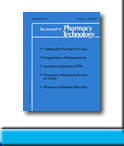 |
 |
INFLUENCE OF STORAGE AT
LOW TEMPERATURES ON THE AEROSOL OUTPUT FROM METERED-DOSE AND DRY-POWDER
INHALATION DEVICES
Mercedes Ramón, Gustavo Juan,
José M Torrejón, Ezequiel MartÍ-Bonmatí, Julio
Cortijo, Esteban J Morcillo, and Julio Marín
To request full article click here.
OBJECTIVE: To determine whether storage at low temperatures affects the drug delivery efficacy of a chlorofluorocarbon (CFC)–free aerosol and a dry-powder inhaler (DPI).
DESIGN: Aerosol output from a CFC-free hydrofluoroalkane (HFA-134a) metered-dose inhaler (albuterol) and a multidose DPI (terbutaline) were examined at different ambient temperatures and canister loads.
RESULTS: After the HFA-134a formulation was stored at low temperatures for 24 hours, a small decrease of aerosol output (2.1–2.7% at 0 °C, 5.0–8.0% at –10 °C; p < 0.05 from 22 °C) was observed. In addition, the aerosol output from devices with one-half or one-fifth the initial content was marginally decreased compared with output from inhalers with full content. Image analysis techniques applied to fully formed aerosol plume emitted from the HFA-134a formulation showed that the product could still be aerosolized at 10 °C, but there was a reduction of the distance reached by the aerosol. In contrast, condensed droplets markedly altered the aerosols formed from CFC inhalers at –10 °C. Aerosol output from the DPI apparently was not altered following 24-hour storage at –10 °C.
CONCLUSIONS: Aerosols emitted by the HFA-134a and DPIs studied were less affected by exposure to cold temperatures compared with those from marketed CFC devices.
J Pharm Technol 2000;16:12-7.
To request full article click here.
|
|
|
||
|

